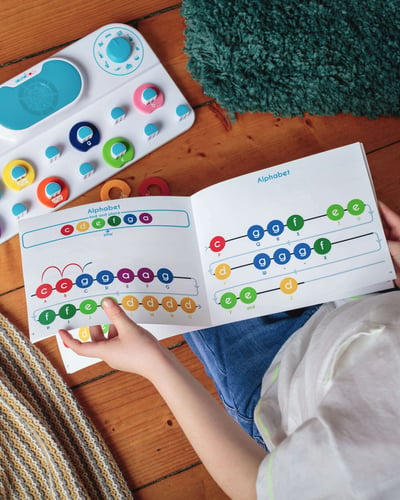Search for topics or resources
Enter your search below and hit enter or click the search icon.

Music + Child x Fun = Maths skills.
It seems like a strange calculation, but music and mathematics are more closely related than you think (and, just in case you were wondering, this is definitely not an article about math rock).
But can music improve your child's math skills?
What do composers and calculus have in common?
Can listening to songs save you from trying to remember your long division (me neither)?
Let's take a look at the links between mathematics and music with James Barrett-Bunnage, the creator of Soundbops, and how learning an instrument could help unlock your child's learning potential.
We’ve long recognised the links between mathematics and music. The Ancient Greeks saw the repetition – and the recognition - of patterns in both disciplines as the same interpretation of the world.
The philosopher Plato said that he “would give children music, physics and philosophy, but the most important is music, for in the patterns of the arts are the keys to all learning.”
And the structural links are clear: counting beats and rests, repeating patterns and sequences are found in both maths and music. So are the expressive similarities: formal systems of description, and symbols to stand in for numbers and sounds. Music notation is a symbolic representation of sound in time.
Rhythm is a form of counting. The mathematician Gottfried Leibniz described music as “the sensation of counting without being aware you were counting." And reading music, like reading mathematical notation, needs counting – of the beat, of the number of notes, of pauses and when to come back in when playing in a group.
Mathematician Marcus du Sautoy says “Music is full of mathematics. Rhythm is about exploring the way different numbers interact. Theme and variation exploit ideas of symmetry.”
Even on a cognitive level, music and maths have much in common.

Cognitive psychologists see three systems of understanding numbers in a child’s development. The first is spatial sense, or the ability to grasp shape and its place in space. This is the basis of geometric forms and the arrangement of musical sounds in a sound space.
The second is subitising, which is the ability to identify and differentiate between small amounts. This is the intuitive grasp that three things are more than one thing – whether counters or sounds.
And, thirdly, numerical representation, which is the ability to estimate larger quantities. This is the system that leads to using symbols to represent numbers (and notes).
These three fundamental systems converge in children between the ages of three and six. They are the basis of mathematics – spatial reasoning, quantity recognition and judgement of magnitude. And also of music.
Studies have suggested a connection between music and spatial-temporal reasoning. Spatial-temporal reasoning is the ability to mentally move objects to solve problems, such as loading a car trunk with bags and boxes without having to do so multiple times with trial and error.
Since music is sound existing in space and usually moving in time, it seems logical that training in music could facilitate spatial-temporal reasoning. With this in mind, music education and learning improve mathematical ability.

Rhythm depends on arithmetic, harmony draws from numerical relationships, and the development of musical themes reflects symmetry and geometry. As the composer Stravinsky said: "The musician should find in mathematics a study as useful to him as the learning of another language is to a poet. Mathematics swims seductively just below the surface."
Neuroscientists have found that music training increases cognitive function significantly. If maths is the science of pattern, then music and movement are the art of pattern. The exploration of music and dance in the early years works with the human mind’s need for pattern, and helps develop ordering, classifying, sequencing and predicting - the foundations for understanding maths.
Adam is the Content Manager at pBone Music. This should mean that he’s the ideal person to write about himself, but he finds boasting in the third person a little awkward. He honed his word wizardry with a degree in English Language and Literature at the University of Leeds. He has since written copy for clients and businesses across the land, from awards to something beginning with “z”. He also spent a number of years as a musician. He has written pop songs and even jingles for kids, performed more first dances at weddings than you could shake a pBuzz at, and once played a gig for a pie company at The Etihad Stadium in Manchester. When he’s not reminiscing about those good old days, you might find Adam enjoying the football (although as an Everton fan, that can be difficult). He also loves spending time with his partner, Jen, and his family and friends, and sincerely hopes they feel the same way.